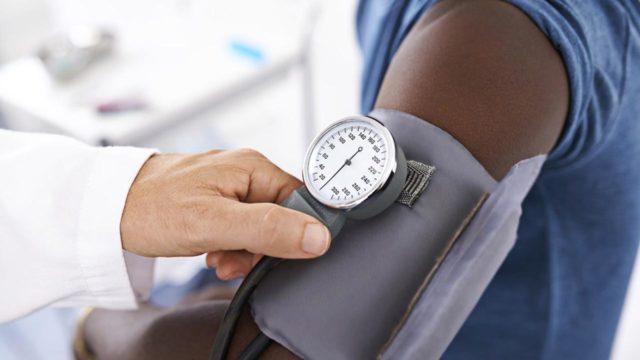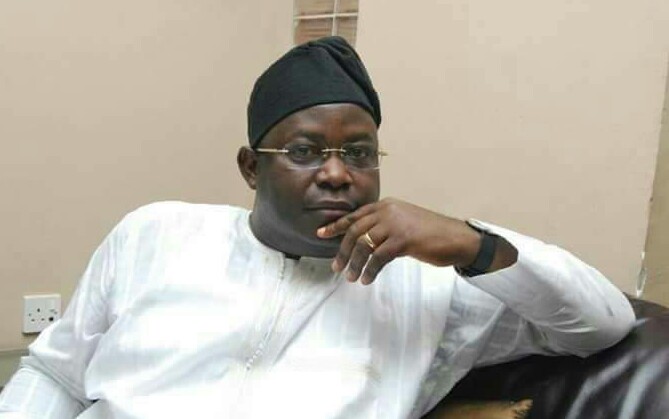News
80m Nigerians Living With Hypertension, 26.7m Receiving Treatment

As Nigeria joins the rest of the world to mark the World Hypertension Day, which has as theme ‘Measure your blood pressure accurately, control it, live longer,’ medical experts, including the World Health Organisation (WHO), Nigerian Medical Association (NMA) and Nigerian Heart Foundation (NHF), have warned that the prevalence of hypertension in the country is on the rise. This, they said is, due to prevailing insecurity and poor socioeconomic condition.
Specifically, Executive Director of NHF, Dr. Kingsley Akinroye, yesterday, told The Guardian that the prevalence of hypertension is estimated to be between 30 and 40 per cent of Nigeria’s over 200 million population, which is in the range of 60 to 80 million Nigerians.
He had, last year, told The Guardian that the prevalence of hypertension in the country was as much as 38.1 per cent.
Akinroye, who is also a consultant cardiologist, said, almost one in three adults suffers from hypertension, while only one third of this figure (about 26.7 million Nigerians) are on treatment.
He said a survey by the NHF showed the awareness of hypertension is more in the urban than rural areas and more amongst women than men.
“Since the onset of COVID-19 in Nigeria, we have evidence that more people with heart disease have been affected or died from the pandemic than any other illness. Also, we are aware that the cost of treatment with anti-hypertensive drugs has gone up.”
He noted that the ideal blood pressure is 120/80 mmHg, but in Nigeria, normal blood pressure is 140/90 mmHg. “Any figure higher than 140 mmHg for systolic blood pressure or 90 mmHg for diastolic blood pressure is regarded as hypertension.”
Another hypertension expert, Dean, Faculty of Clinical Sciences and Director, Centre for Genomic and Precision Medicine, College of Medicine, University of Ibadan, Prof. Mayowa Owolabi, said about 50 million Nigerians and nearly half of those above 25 years are hypertensive at Blood Pressure (BP) greater and equal to 140/90 mmHg.
Owolabi blamed the rise on unhealthy diet (red meat, high salt intake and low consumption of green leafy vegetables), sedentary lifestyle, obesity, smoking and air pollution.
Owolabi, who is also the Lead Co-Chair, WHO-World Stroke Organisation-Lancet Neurology Commission on Stroke, said increase in complications is due to the low proportion of individuals with hypertension who are diagnosed, treated and controlled. The consultant neurologist said, in Africa, up to 93 per cent of those with hypertension are unaware, untreated or uncontrolled, adding that uncontrolled hypertension is the premier risk factor for stroke, heart attack, kidney failure and heart failure.
Owolabi said unaffordability of treatments for hypertension is one of the reasons for poor adherence to treatment.
He said health insurance coverage for hypertension treatment, subsidising medication cost, and provision of free generic medications through collaboration between government and pharmaceutical companies will improve access.
On recommendations on how to reduce the burden of hypertension in Nigeria, Owolabi said screening for hypertension should be mandatory for citizens above the age of 18.
“This can be implemented at all health facilities, especially primary healthcare centres. Hypertension treatment and control should be enhanced through a protocol-based referral system that empowers primary healthcare centres to participate under supervision in the initiation of treatment for uncomplicated hypertension,” he said.
He said there is no proven cure for hypertension but prevention is better than cure, as it could be prevented through healthy diet with frequent consumption of green leafy vegetables, avoidance of excessive table salt and red meat intake and maintaining a healthy weight and body mass index.
For health and wellbeing, WHO recommends at least 150 to 300 minutes of moderate aerobic activity per week (or the equivalent vigorous of activity) for all adults, and an average of 60 minutes of moderate aerobic physical activity per day for children and adolescents.
According to the first comprehensive global analysis of trends in hypertension prevalence, detection, treatment and control, led by Imperial College London and WHO, and published in The Lancet journal, the number of adults aged 30 to 79 years with hypertension has increased from 650 million to 1.28 billion in the last 30 years. Nearly half of these people did not know they had hypertension.
The study, conducted by a global network of physicians and researchers, covered the period 1990–2019. It used blood pressure measurement and treatment data from over 100 million people aged 30 to 79 years in 184 countries, together covering 99 per cent of the global population, which makes it the most comprehensive review of global trends in hypertension to date.
By analysing this massive amount of data, the researchers found that there was little change in the overall rate of hypertension in the world from 1990 to 2019, but the burden has shifted from wealthy nations to low- and middle-income countries.
The rate of hypertension has decreased in wealthy countries – which now typically have some of the lowest rates – but has increased in many low- or middle-income countries.
A public health physician and Global Health Expert/Chief Technical Advisor, E4HDI, Dr. Nnenna Marcelina Ezeigwe, said because many people do not check their blood pressure regularly as a matter of routine, they only become aware when kidney damage has occurred.
“Therefore, rising cases of kidney failure is a good indication of high prevalence of hypertension,” she said.
Ezeigwe said many patients are not taking the recommended drugs because of the high cost of treatment and high level of poverty in Nigeria.
“In 2020, Idris Abubakar and Obansa S.A.J. estimated the yearly cost of treating hypertension to be N145,086.12 in Abuja, mostly paid out of pocket. I believe this amount is far below what it actually costs now to manage hypertension in Nigeria while the minimum wage has remained the same and insecurity has led to diminished productivity of rural farmers.
“The implication of failure to treat hypertension adequately is simply more stroke, Ischaemic heart disease, kidney failure, amongst other complications and resultant mortality,” she said.
Medical Director, Optimal Specialist Hospitals, Gbaja, Surulere, Lagos State, Dr. Celestine Chukwunenye, said there has been a noticeable rise in the percentage of people living with hypertension worldwide as well as a rise in the percentage of severe and complicated cases.
He said the rise is due to worsening socio-economic and political conditions in the country, lack of exercise, poor dietary habits, increase in cholesterol levels, smoking, excessive alcohol consumption and inadequate night sleep.
He said with the outbreak of COVID-19, people living with hypertension and other co-morbidities were at greater risk of severe illness and death. Fortunately, cases of COVID-19 are now in the decline.
Chukwunenye, who is also a consultant obstetrician and gynaecologist, however, said there are many herbal or natural remedies including acupuncture, some fruits, vegetables, roots, nuts and snails but their efficacy and contribution to the management of hypertension need further evaluation.
Chairman of the NHF Hypertension Committee, Prof. Basden J.C. Onwubere, said a crucial first step for control of hypertension and achievement of the United Nations 2025 goal for a 25 per cent reduction in uncontrolled hypertension is to improve hypertension diagnosis and strategies have been put in place to encourage BP screening and awareness programmes in communities.
A consultant pharmacist and a fellow of the West African Postgraduate College of Pharmacists, Dr. Joseph Madu, told The Guardian: “I don’t think that the high cost of drugs is solely responsible for patients not taking their drugs as recommended. That could be a reason but many effective hypertensive drugs are cheap, but rather ignorance and inadequate health education leading to non-compliance and poor adherence are the primary causes. With proper engagement of clinical pharmacists, the challenge can be drastically curtailed.”
To reduce the burden of hypertension in Nigeria, Madu recommended adequate health education and public enlightenment about the disease burden; formation of policies that will encourage patients and the less privileged to access care; policies to enhance access to free blood pressure checks at designated centres will be very helpful; lifestyle changes such as reduced salt and low calorie intake, brisk exercise such as a walk for 30 minutes daily, reduced alcohol and avoidance of tobacco intake etc.
Madu said hypertension has no known cure whether through herbal or orthodox medicine. He, however, said it could be managed to prevent morbidity and mortality. The clinical pharmacist said the danger in using herbal medications is that they are not standardised, most times, as to guarantee proper usage.
He said some natural products used as herbs have blood pressure lowering effects but their usage, especially when combined with orthodox medicine, must be under strict supervision of a competent health care provider.
On what causes hypertension, President, NMA, Prof. Innocent Ujah, said: “The causes are not fully known in most cases and it’s called primary/essential hypertension in about 10 per cent of the cases where the condition is known; it is called secondary hypertension (kidney, blood vessels and hormonal disorders are known causes).”
Ujah, who is also a consultant obstetrician and gynaecologist, said essential hypertension is associated with two broad risk factors. Modifiable or preventable factors are: high intake of salt, overweight, sedentary lifestyles, physical inactivity, diabetes mellitus, tobacco smoking, alcohol intake and stress.
Ujah listed unmodifiable or non-preventable factors to include: family history (hereditary), inheritance from parents, age, sex, and black race, adding: “The reality is that HBP is a common disease and a silent killer. Unfortunately most people are not aware. People should do BP check-up regularly.
“Poverty is a very big problem as well as anxiety. They fuel hypertension. So being poor is a big risk factor. For the rich, the problem is their uncontrolled enjoyment. They don’t control eating and drinking. There are several other causes of hypertension like eclampsia and preeclampsia in pregnant women, which are the commonest killers of women in childbirth. Eclampsia can be controlled but not preeclampsia.
“BP is not a death sentence but can be controlled with regular check up, lifestyle changes and medication,” he said.
-

 News4 days ago
News4 days agoUpdated: Oyo Police Parade Arrested Yoruba Nation Agitators
-

 News3 days ago
News3 days agoJust In: Adeleke Appoints Former Osun Commissioner For Finance, Bolorunduro Chairman Of Living Trust Mortgage Bank
-

 News4 days ago
News4 days ago‘21 Chibok Girls Return With 34 Kids; 48 Parents Die Of Trauma’
-

 News1 day ago
News1 day agoBreaking: JAMB Directs CBT Centres To Arrest Parents Found Near Facilities During UTME Exercise



